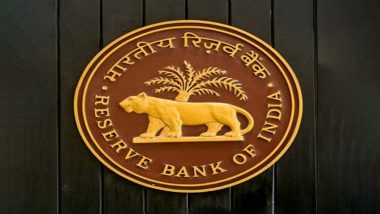Mumbai, Oct 9: In order to promote the housing sector, Reserve Bank of India on Friday decided to rationalise risk weightage on housing loans, making the product attractive for both borrower and lenders.
With revision in the risk weightage, the requirement of capital provision for banks will come down. This will encourage banks to push housing loan products with attractive features.
"Recognising the criticality of the real estate sector in the economic recovery, given its role in employment generation and the interlinkages with other industries, it has been decided, as a countercyclical measure, to rationalise the risk weights by linking them only with Loan to Value (LTV) ratios for all new housing loans sanctioned up to March 31, 2022," RBI Governor Shaktikanta Das said. RBI Keeps Repo Rate Unchanged at 4% Amid High Inflation.
Such loans shall attract a risk weight of 35 per cent where LTV is less than or equal to 80 per cent, and a risk weight of 50 per cent where LTV is more than 80 per cent but less than or equal to 90 per cent, he said.
This measure is expected to give a fillip to bank lending to the real estate sector, the statement on Developmental and Regulatory Policies said.
According to a Bank of India senior official, the RBI's move will give a major boost to the housing sector particularly the retail housing.
"Banks will definitely be benefited with lower provisioning by lending to this segment which will ultimately encourage banks to make this product more price attractive," the official said.
Commenting on the decision, Housing.com Group CEO Dhruv Agarwala said rationalising risk weightage on home loans and linking it to LTV ratio will effectively result in higher credit flow to the real estate sector, which is positive news for the sector.
Also, the hike in credit limit for retail exposure by a single lending entity from Rs 5 crore to Rs 7.5 crore is a welcome move that will immensely help both retail as well as small businesses, he said.
As per the present RBI instructions, the exposures included in the regulatory retail portfolio of banks are assigned a risk weight of 75 per cent. For this purpose, the qualifying exposures need to meet certain specified criteria, including low value of individual exposures. In terms of the value of exposures, it has been prescribed that the maximum aggregated retail exposure to one counterparty should not exceed the absolute threshold limit of Rs 5 crore, the statement said.
"In order to reduce the cost of credit for this segment consisting of individuals and small businesses (with turnover of up to Rs 50 crore), and in harmonisation with the Basel guidelines, it has been decided to increase this threshold to Rs 7.5 crore in respect of all fresh as well as incremental qualifying exposures," it said. This measure is expected to increase the much needed credit flow to the small business segment, it said.













 Quickly
Quickly





















